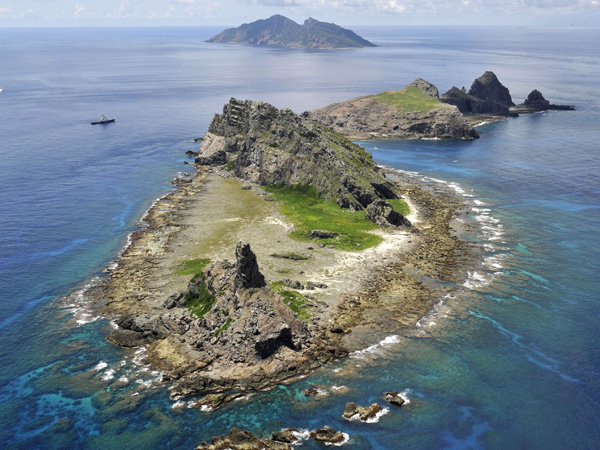
In this Sept. 2, 2012 file photo, the survey ship Koyo Maru, left, chartered by Tokyo city officials, sails around Minamikojima, foreground, Kitakojima, middle right, and Uotsuri, background, the tiny islands in the East China Sea, called Senkaku in Japanese and Diaoyu in Chinese. Japan’s Cabinet formally announced Tuesday, Sept. 11, 2012 that the government will purchase several disputed islands that China also claims – a plan that Beijing said would be met with “serious consequences.” AP FILE PHOTO
TOKYO — Japan’s government said Monday it has decided to purchase several disputed islands, prompting China to angrily warn of “serious consequences” if it proceeds with the plan.
Chief Cabinet Secretary Osamu Fujimura said Japan will buy the three uninhabited islands in the East China Sea from a private Japanese family it recognizes as the owner. China and Taiwan also claim the islands, which are part of what Japan calls the Senkakus and China the Diaoyu group.
Fujimura said the decision to nationalize the islands reflects Japan’s desire to create a “stable and secure” environment, not to anger China.
“We hope there will be no misunderstandings,” he said.
China’s Foreign Ministry responded swiftly, saying Beijing would not “sit back and watch its territorial sovereignty violated.”
“China strongly urges Japan to immediately stop all action to undermine China’s territorial sovereignty and return to a negotiated settlement to the dispute. If Japan insists on going its own way, it will bear all the serious consequences that follow,” the ministry said in a statement.
It did not specify the possible consequences.
All the major state newspapers in China ran the ministry statement on their front pages Tuesday, along with comments from Premier Wen Jiabao.
“The Diaoyu Islands are an inalienable part of China’s territory, and the Chinese government and its people will absolutely make no concession on issues concerning its sovereignty and territorial integrity,” Wen said at an inauguration ceremony for a statue of late Chinese leaders Zhou Enlai and Chen Yi at the China Foreign Affairs University in Beijing.
State-run China Central Television reported that Foreign Minister Yang Jiechi summoned the Japanese ambassador to protest the plan.
Fujimura said the decision to buy the islands was made at a meeting of Cabinet ministers who are involved in the purchase plans. The full Cabinet, led Prime Minister Yoshihiko Noda, is expected to approve the decision on Tuesday.
Supporters think having the government own the islands will strengthen Japan’s claim and control over them and send a tougher message to China.
Under the nationalization plan, the islands are to be left as they are now. China does not recognize the Japanese family’s deed to the islands as legitimate.
In April, the outspoken nationalist governor of Tokyo announced that he was hoping that his city would buy the islands and push for their development, a move that would have inflamed relations with China even more.
The dispute has long been a flashpoint in Japan-China relations, and has been heating up in recent months.
Earlier this month, the city of Tokyo sent a team of experts to waters around the islands to survey fishing grounds and possible sites for development, a move that was strongly criticized by China. Activists from Japan and Hong Kong briefly set foot on the islands last month, and hundreds of Chinese have held street protests in various cities in recent weeks.
The dispute over the islands boiled over into a major diplomatic tiff between the two neighbors after a Sept. 7, 2010, incident in which a Chinese fishing boat collided with Japanese coast guard ships near the islands. The fishing boat captain was arrested and later released.